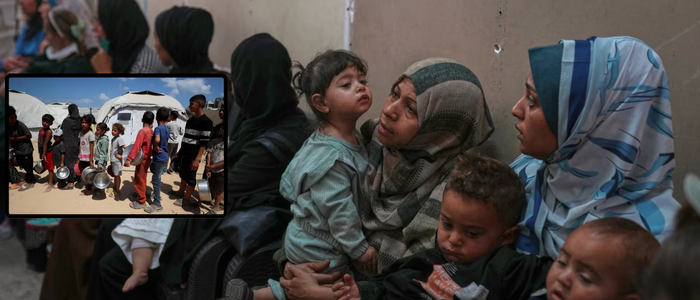At least 44 people were reported killed in Gaza on Thursday, including 23 in the Bureij refugee camp. The violence was occurring against the backdrop of extensive food shortages and a complete Israeli blockade that has persisted for more than 11 weeks, greatly restricting the flow of aid and commercial goods.
Aid Efforts Overrun by Crowds
Attempts to distribute aid have devolved into chaos. On Tuesday, at the new aid centre opened by the US and Israeli-backed Gaza Humanitarian Foundation (GHF) in the troubled town of Rafah, close to 50 people were reportedly shot and wounded as the crowd broke through the gates. The Israeli military said it had only fired warning shots into the air. The same scenes played out on Thursday at the location, as thousands congregated in anticipation of food.
Order quickly crumbled moments after a drone led to an announcement urging people to go to the distribution centre, according to one witness who reported the situation from the GHF site. Videos from the region show people walking with sacks of flour, and some using horse carts and bicycles to get aid to the area. But many, especially the elderly and women, did so empty-handed.
"The youth were the first to get the assistance... but the old people and women are not able to pass because the place is packed," along the bank on the eastern side, 60-year-old Abu Fawzi Faroukh said. Another resident, Umm Mohammed Abu Hajar, said she discovered an area teeming with hungry people and went back home empty-handed.
The GHF had handed out more than 17,000 food boxes on Thursday and said it was looking to expand its efforts. It refuted the allegations that its workers or those who came for assistance were shot at. But the UN, which has not gone along with the GHF system, has criticized it as insufficient and "engineer[ing] scarcity."
Blockade and Aggression Persist
The situation has worsened even further since Israel declared a total blockade of Gaza on March 2 and then began its offensive again soon after a short-term ceasefire. Prime Minister Benjamin Netanyahu of Israel recently stated that Israeli forces would "seize control of every part" of Gaza. The government has promised to let in scant food supplies, but humanitarian groups have said it won't be enough to satisfy the needs of the 2.1 million residents.
Meanwhile, families of Israeli captives are calling on Canada to support a new proposal for a ceasefire. The Arab version of the Cairo understanding, a new one this time, provides for a 60-day truce in return for releasing hostages and Palestinian prisoners, the US and Israeli officials said. Yet Hamas rejected the plan, saying it did not provide enough guarantees of a full withdrawal and an end to hostilities.
Israel launched its military offensive following Hamas' October 7 attack that resulted in the deaths of some 1,200 people and the abduction of 251 hostages. Gaza's health ministry has reported that more than 54,000 people have died since, including almost 4,000 since the offensive resumed.
















